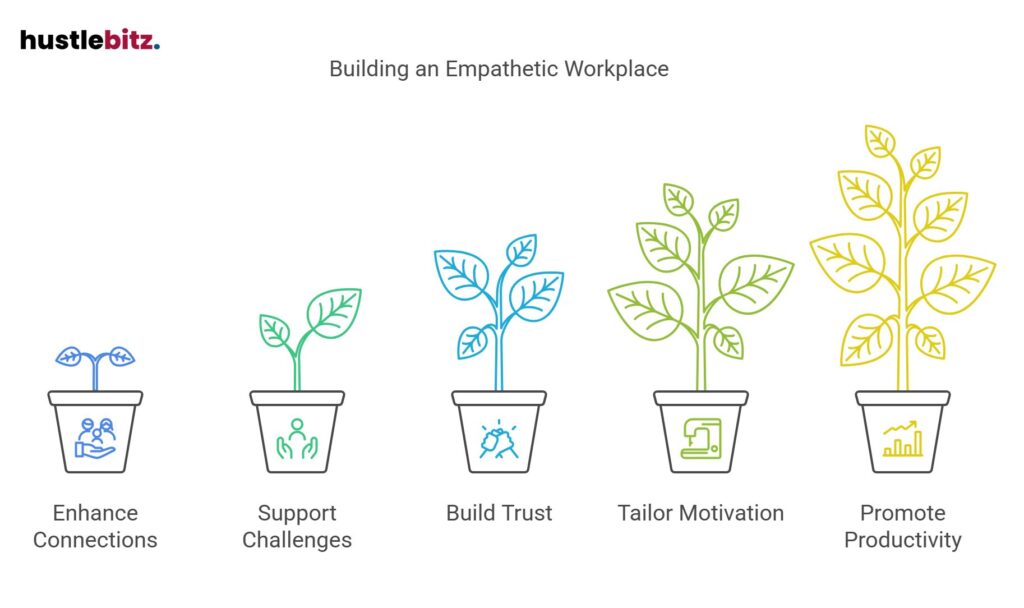Empathy in leadership is essential for fostering a motivated workforce. It enhances communication and builds trust within teams, promoting collaboration and open dialogue. Leaders who practice empathy attend to the unique emotional needs of their team members, which drives engagement and job satisfaction. This supportive atmosphere not only increases morale but also reduces turnover rates by creating a sense of belonging. Empathetic behavior encourages a culture of understanding that motivates individuals to contribute their best. As such, exploring further offers insights on how to implement empathetic practices for greater organizational success.
Key Takeaways
- Empathy enhances emotional connections, driving engagement and commitment among team members.
- Understanding individual challenges fosters a supportive atmosphere, which boosts employee retention.
- Empathetic leaders create trust, facilitating open communication and collaboration within teams.
- Tailoring motivational approaches to individual needs improves job satisfaction and overall engagement.
- Emotional contagion in empathetic environments promotes motivation and productivity among employees.

The Power of Empathy in Leadership
Empathy serves as a foundational pillar in effective leadership, fostering trust and collaboration within teams. The power of empathy in leadership extends beyond mere understanding; it actively shapes the dynamics of an organization.
Empathetic leadership encourages leaders to engage with their team members on a personal level, acknowledging their emotions and perspectives. This approach cultivates an environment where individuals feel valued, leading to increased morale and productivity.
Effective communication is a crucial component of empathetic leadership. When leaders demonstrate genuine concern for the feelings and experiences of their employees, they create a safe space for open dialogue. This two-way communication not only facilitates problem-solving but also enhances teamwork, as employees are more likely to share ideas and feedback when they feel understood.
Moreover, the power of empathy can significantly impact organizational success. Companies led by empathetic leaders often experience lower turnover rates, as employees are more likely to remain loyal to an organization that values their well-being.
This loyalty, combined with improved collaboration, can lead to higher levels of innovation and performance.
Empathy: Key Motivational Force in Leadership

As a key motivational force in leadership, understanding and addressing the emotional needs of team members can drive engagement and commitment.
Empathy enables leaders to connect with their employees on a deeper level, fostering an environment where individuals feel valued and understood. This emotional connection is essential for effective leadership, as it cultivates trust and enhances communication within teams.
Organizational leaders who prioritize empathy are better equipped to recognize the unique challenges faced by their employees. By actively listening and demonstrating genuine concern for their well-being, these leaders can create a supportive atmosphere that encourages employee engagement and retention.
When team members feel that their leaders are attuned to their feelings and experiences, they are more likely to remain committed to their roles and contribute positively to the organization’s goals.
Moreover, empathy serves as a motivational catalyst, inspiring employees to perform at their best. When leaders model empathetic behavior, they set a standard for their teams, promoting a culture of understanding and collaboration.
This not only enhances team performance but also reduces turnover rates, as employees are less likely to seek opportunities elsewhere when they feel supported.
Empathy in Leadership: Driving Team Motivation
A leader’s ability to foster motivation within a team is significantly enhanced by their capacity to understand and respond to the emotional landscape of their employees. Empathy is essential in this process, as it allows leaders to connect with their team members on a deeper level. When leaders understand the unique experiences and feelings of their employees, they can tailor their approach to meet individual needs, which in turn boosts morale and engagement.
By creating an environment that prioritizes emotional awareness, leaders can cultivate a culture of trust and collaboration. This atmosphere not only encourages open communication but also enables team members to express their thoughts and feelings without fear of judgment. When employees feel heard and valued, their emotional response to challenges becomes more positive, leading to enhanced motivation and productivity.
Moreover, empathetic leaders are adept at recognizing signs of disengagement or distress within their teams. By addressing these issues proactively, they can implement strategies that resonate with employees’ needs, thereby re-energizing the workforce. This responsiveness reinforces the notion that leaders are invested in their team’s well-being, fostering a sense of loyalty and commitment.
The Role of Empathy in Motivation

Understanding the emotional needs of team members plays a critical role in enhancing motivation within the workplace. Empathy as a leader involves actively listening and responding to the feelings and concerns of team members. This understanding fosters an environment where individuals feel valued and recognized, which is essential for boosting motivation.
When leaders demonstrate empathy, they create genuine connections with their teams. These connections not only build trust but also encourage open communication. Team members who feel understood are more likely to share their ideas and challenges, leading to a more cohesive and motivated team.
Furthermore, leaders who exhibit empathy can navigate the phenomenon of emotional contagion, where positive emotions can spread throughout the team. This creates a supportive atmosphere that is conducive to increased motivation and productivity.
An empathetic leader’s ability to understand their team allows them to tailor their approach to individual motivations and aspirations. By recognizing what drives each team member, leaders can align tasks and responsibilities with personal goals, enhancing overall engagement.
This personalized approach not only boosts motivation but also improves job satisfaction, reducing turnover rates.
Empathy as a Motivational Tool

Empathy serves as a powerful motivational tool, enabling leaders to connect deeply with their team members and inspire them to reach their full potential. In today’s diverse work environment, leaders need to cultivate an atmosphere where employees feel understood and valued. By practicing empathy, leaders demonstrate an authentic commitment to understanding others’ feelings, which fosters trust and openness within the team.
When leaders actively listen and engage with their team members’ emotions, they create a work culture that prioritizes psychological safety. This sense of belonging encourages individuals to share their ideas and concerns without fear of judgment, ultimately enhancing collaboration and innovation. Employees who feel emotionally supported are more likely to be motivated, productive, and committed to the organization’s goals.
Moreover, empathy is a powerful driver of employee retention. When team members perceive that their leaders genuinely care about their well-being, they are more likely to remain loyal to the organization. This loyalty can translate into higher morale and decreased turnover rates, ultimately benefiting the organization’s bottom line.
Building Motivated Teams Through Empathetic Leadership

Consistently fostering an environment of empathetic leadership significantly enhances team motivation and cohesion.
Empathy in the leadership role not only nurtures individual relationships but also cultivates a psychologically safe atmosphere within the organization. When team members feel valued and understood, they are more likely to be engaged and motivated in their work.
To effectively build motivated teams through empathetic leadership, consider the following strategies:
- Active Listening: Encourage open dialogue by truly listening to team members’ concerns and ideas.
- Emotional Awareness: Recognize and validate the emotions of team members, fostering a sense of belonging.
- Supportive Feedback: Provide constructive feedback that prioritizes growth and development, rather than criticism.
- Inclusive Decision-Making: Involve team members in decisions that affect their work, enhancing their sense of ownership.
- Recognition and Appreciation: Regularly acknowledge individual and team achievements to reinforce motivation and commitment.
Strategies for Developing Empathetic Leadership

To cultivate empathetic leadership, leaders must engage in intentional practices that enhance their emotional intelligence and interpersonal skills.
Empathy is the ability to understand and share the feelings of others, which is essential for fostering a supportive workplace environment. An empathetic leader actively seeks to connect with team members, recognizing their individual perspectives and emotions.
One effective strategy is to practice active listening. This involves fully focusing on the speaker, making eye contact, and responding appropriately to their concerns. By doing so, leaders create an atmosphere where team members feel valued and understood. This practice not only strengthens relationships but also encourages open communication, allowing issues to be addressed before they escalate. Furthermore, leaders create opportunities for team bonding through team-building activities and open forums for discussion. This approach helps in building trust, as employees feel more comfortable sharing their thoughts and feelings in a safe environment.
Empathetic leaders also benefit from regularly soliciting feedback from their teams, demonstrating that they value their input and are committed to continuous improvement. Incorporating these strategies enables leaders to demonstrate genuine care for their team’s well-being, ultimately leading to higher morale and productivity. By prioritizing empathy, leaders not only enhance their effectiveness but also contribute to a healthier workplace culture that encourages collaboration and innovation.
Adopting these practices paves the way for a transformative leadership style that resonates deeply with others.
Final thoughts
Empathy in leadership is not just a soft skill; it’s a powerful tool that drives motivation, fosters trust, and enhances overall team performance. By prioritizing empathy, leaders create an environment where employees feel valued and understood, leading to higher engagement, lower turnover rates, and a culture of collaboration and innovation. Embracing empathetic practices is essential for any leader looking to inspire their team and achieve long-term organizational success.




